Mozambique: Extreme violence undermines Cabo Delgado economy - AIM report
Mozambique: State of emergency; Covid-19 could be as bad as AIDS – By Joseph Hanlon
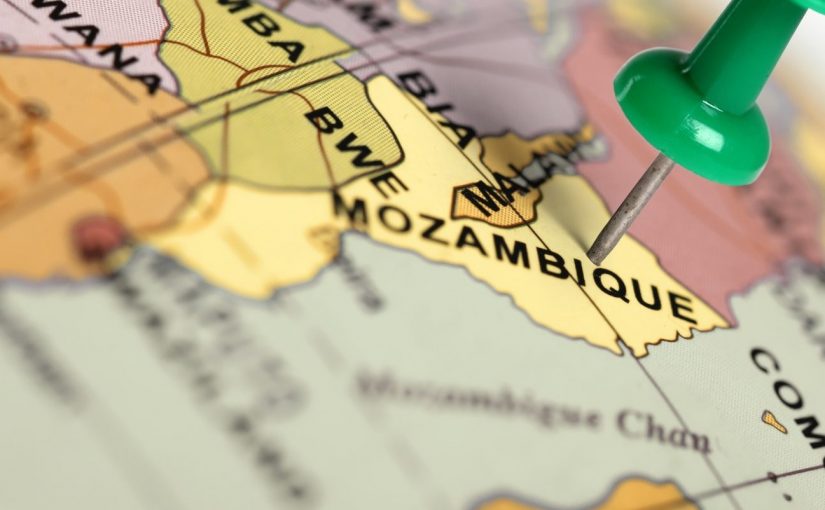
President declares state of emergency for Covid-19
In a televised statement, President Filipe Nyusi yesterday evening declared a state of emergency because of the Covid-19 crisis. It will take effect Wednesday 1 April and run for 30 days. The state of emergency would allow restrictions on movement to reduce contacts and transmission of the disease. Nyusi said it would not be a full lockdown, but gave no other details. Actions will be defined tomorrow at the Council of Ministers meeting.
On Friday afternoon the Council of State had advised the President to call a state of emergency. The Council of State is an advisory body which the President must consult before issuing a state of emergency. The Council was named by parties in parliament Thursday and sworn in by Nyusi Friday morning. In the afternoon it held its first meeting. Covid-19 was the only point on the agenda, and the Council suggested that, in the light of the danger of a rapid spread of the disease, Nyusi should declare a state of emergency. (AIM 28 Mar)
The Constitution says that a state of emergency can only be declared “in cases of actual or imminent aggression, a serious threat to or disturbance of the constitutional order, or a public disaster”. Covid-19 is a “public disaster”. Once he has declared the state of emergency, the President must submit it to parliament (the Assembly of the Republic, AR) for ratification within 24 hours. The AR has 48 hours to decide whether or not to ratify the state of emergency.
Under a state of emergency, measures may be taken to curtail individual rights and freedoms. A state of emergency lasts for 30 days and can be renewed twice. Under the Constitution, there is no way that a state of emergency can last for more than 90 days. Mozambique has never before declared a state of emergency
There has been quite an intense debate in the independent press over a possible lockdown. The main argument is that with most people being very poor, living from day-to-day in self-built houses without proper access to water and with no food reserves, it is impossible for households to be isolated. The counter argument is that the alternative is worse – of households having to cope with sick and dying people because health services are overwhelmed. See http://www.verdade.co.mz/
Covid-19 could be as serious as AIDS
The Imperial College model published last week estimated that Covid-19 could kill up to 65,000 Mozambicans this year, if nothing is done to block transmission. (See this newsletter 476, 27 March). UNAIDS estimates that in 2018, AIDS killed 54,000 people in Mozambique and 150,000 people were newly infected. UNAIDS estimates that 2.2 mn Mozambicans are infected with AIDS and 1.2 mn are on antiretroviral therapy.
No money direct to government
There will be no resumption of budget support and no new money direct to government, the European Union representative Antonio Sanchez-Benedito told O Pais Economico (27 Mar). At a meeting with donors Monday (23 March), government asked for $703 mn to fight Covid-19, and asked part of it as budget support – money given directly to the government budget.
All donors stopped budget support and money directly to government in May 2016 when the $2 bn secret debt was revealed. Sanchez-Benedito made clear that there was no chance of a resumption until the government agreed with the IMF a programme that included transparency and good financial management. And that is some way off. An IMF team was due in mid-March to start discussions, but the trip was cancelled due to Covid-19.
All Sanchez-Benedito offered was to reallocate some money already in the EU budget for Mozambique.
Asked about promised money for cyclones Idai and Kenneth, he said the EU had promised €100 mn and the European Investment Bank (EIB) has promised another €100 mn. Of the EU money, €75 mn has been spent, in part for food and through a UN common fund. The other €25 mn and the EIB €100 mn is still being sorted out because it is for infrastructure projects jointly with other donors. He did not say so explicitly, but made very clear the EU was not letting government get its hands on the money, which would all be controlled by the donors and UN.
The Public Integrity Centre (CIP) points out that of the $703 mn, $553 mn is to build 79 district hospitals promised by President Filipe Nuysi in his election campaign last year.
https://cipmoz.org/2020/03/25/
Frelimo veteran Panguene to head northern development agency
Retired diplomat Armando Panguene has been named chair of the newly established Agency for the Integrated Development of the North (ADIN), intended in particular to create jobs in Cabo Delgado, Niassa and Nampula as a response to the growing insurgency.
The 77 year old Panguene is a veteran of the liberation war, who served in a wide range of posts including chief of staff of the armed forces; at various times ambassador to Portugal, Britain, South Africa and the United States; deputy foreign and defence ministers; and governor of Cabo Delgado and Nampula provinces.
The agency reports directly to the Council of Ministers and there will be inevitable conflicts with the new elected governors, the nominated secretaries of state in each province, and Minister of Agriculture and Rural Development Celso Correia with his National Fund for Sustainable Development (FNDS) – all of whom have responsibility for local economic development.
Pulling Panguene out of retirement may be an attempt to solve two problems. First, ADIN will need donor money at a time donors are refusing to give cash to the government. Panguene is old guard Frelimo from an era when integrity mattered, and is an experienced diplomat, so might be able to win donor support. But many in Frelimo will want a share of those resources, and Panguene as a liberation war fighter, diplomat, and former governor of Cabo Delgado will know all of the key players and may be able to come to arrangements that allow some of the money to be spent on creating jobs for Cabo Delgado youth.
But his appointment has not been universally welcomed. In 1974, when he was just 32 years old, Panguene was appointed governor of Nampula province in the transitional government. Surely there exist similarly capable young people to take on leadership roles like this, asks Joao Tinga
of the recently created CDD (Centro para a Democracia e Desenvolvimento, Centre for Democracy and Development). ADIN is about creating jobs and creating social and economic conditions for young people, to discourage them from joining radical groups. That requires an “agency to be led by young people with creative and innovative ideas, young people full of energy to get the institution running,” Tinga continues. “It is worth remembering the words of Filipe Nyusi in his inauguration speech: ‘Mozambique is a country of young people. There will be no development in Mozambique without the involvement of young people’.” With millions of young people prepared to take on the challenges of the country, the government must show by example that they have a role, Tinga argues. https://cddmoz.org/armando-
Advisory commissions named
Members of three advisory commissions were named by political parties in parliament on Thursday 27 March. (AIM 27 Mar)
The Council of State advises the President, who must consult the Council prior to any declaration of war, or of a state of emergency or state of siege. The Council must also be consulted if the President wishes to dissolve parliament, to hold a referendum, or to sack any provincial governor or district administrator.
The ruling Frelimo Party, with its huge majority in parliament (184 out of 250 seats), appointed five members to the Council of State, while the main opposition party, Renamo, appointed two. The third parliamentary party, the Mozambique Democratic Movement (MDM) only holds six seats, which is not enough to allow it to appoint any members.
Frelimo named Alcinda Abreu (a member of the Frelimo Political Commission); Methodist pastor Jamisse Taimo (former chair of the National Elections Commission); islamic cleric Aminuddin Mohammed; Felizarda Paulino; and Maria Luisa Massamba. Renamo appointed Juliano Picardo (a former parliamentary deputy, who stood for President of Renamo at the party’s Congress in January 2019, but only received five votes), and businessman Abdul Magide Ibraimo.
President Nyusi chooses four members, and selected former Defence Minister Alberto Chipande (the man reputed to have fired the first shots in Mozambique’s war of independence); former education minister and now a leading civil society activist, Graca Machel; a former Frelimo commander in the liberation struggle, Eduardo da Silva Nihia; and the Mayor of Beira and leader of the MDM, Daviz Simango.
The other members of the Council of State are President Filipe Nyusi, previous presidents (Joaquim Chissano and Armando Guebuza), the speaker of parliament (Esperanca Bias), former speakers (Eduardo Mulembue and Veronica Macamo), the Prime Minister (Carlos Agostinho do Rosario, the chair of the Constitutional Council (Lucia Ribeiro), the ombudsman (Isaque Chande), and the runner-up in the latest presidential election (Renamo leader Ossufo Momade).
The National Defence and Security Council (CNDS) was also named, with four members appointed by Frelimo and one by Renamo. The Frelimo appointees were former Security Minister Jacinto Veloso, former Defence Minister Aguiar Mazua, former Chief of Staff of the Armed Forces Antonio Hama Thai, and founder member of the women’s detachment during the independence war Marina Pachinuapa. Renamo appointed a colonel from its militia, Domingos Manuel Joaquim. Nyusi had already appointed former interior minister Basilio Monteiro as general secretary of the CNDS.
Under the Constitution, the Council must give its opinion prior to any declaration of war, or state of emergency or state of siege, and the suspension of constitutional guarantees these may involve. The CNDS must give its opinion on Mozambican participation in peace missions abroad, advise on the criteria for using zones of total or partial protection intended for the defence and security of Mozambican territory, and “analyse and accompany initiatives of other state bodies that seek to guarantee consolidation of national independence, the strengthening of democratic political power and the maintenance of law and order”.
The National Human Rights Commission was also named. Frelimo selected the former Minister of Gender, Children and Social Welfare, Cidalia Chauque, and lawyer Alfredo Caetano Dias. Renamo appointed Augusto Mateus, who was a political adviser to the later Renamo leader, Afonso Dhlakama.
Carlos Serra dies
Sociologist and researcher Carlos Serra died Tuesday 24 March of lung cancer. Professor catedratico at UEM, from independence he promoted and participated in research that was relevant to Mozambique. He wrote and coordinated the first post-independence Mozambique history book. I have frequently cited his ground-breaking research on the cholera riots which presaged much that is happening now in Cabo Delgado: http://bit.ly/SerraCol
We don’t want the flag of Frelimo
Frequently criticised by government for not stating their goals, the insurgents occupying Quissanga issued a short video. Apparently filmed on the wall of the administrator’s house on Wednesday 25 March, the video shows a fighter holding an Islamic State (IS) flag (see photo). The narrator says “we are fighting to be under this flag; we do not want the Frelimo flag.” He continues: “We want the law of the Koran”. And he stresses, “we are not fighting for the riches of the world. We want salvation.” The short video is on bit.ly/Quissanga-video
Intelyse, a Dubai-based security risk consultant, is monitoring Cabo Delgado closely and has done two detailed reports, on the background (bit.ly/Int-Moz-1) and on the escalating insurgency (bit.ly/Int-Moz-2)By Joseph Hanlon


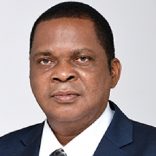
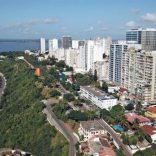
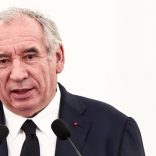
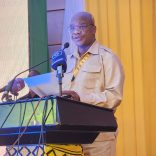

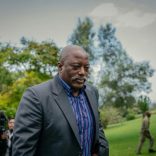




Leave a Reply
Be the First to Comment!
You must be logged in to post a comment.
You must be logged in to post a comment.